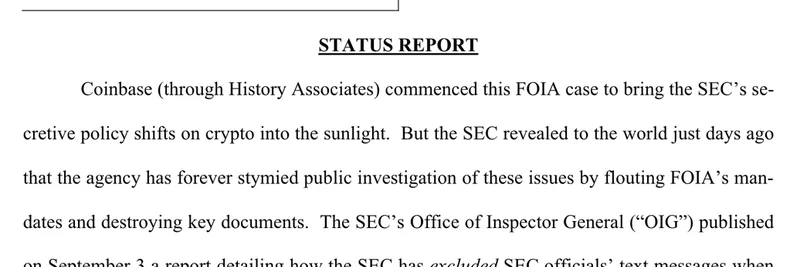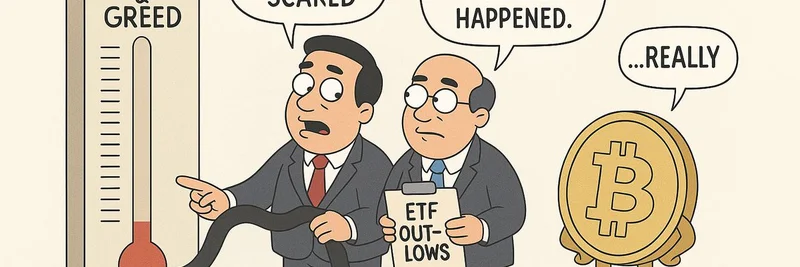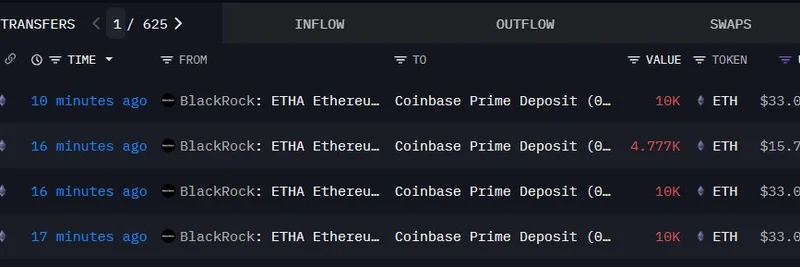In the fast-paced world of crypto, where meme tokens like Dogecoin and newer contenders rise and fall on a whim, regulatory clarity is gold. But what happens when the regulators themselves play fast and loose with the rules? That's exactly the drama unfolding in a recent X thread from Paul Grewal, Coinbase's Chief Legal Officer. On September 11, 2025, Grewal dropped a thread calling out the U.S. Securities and Exchange Commission (SEC) for destroying documents they were legally obligated to keep—documents that could shed light on their crypto policies.
Grewal's thread kicks off with a strong accusation: "The Gensler SEC destroyed documents they were required to preserve and produce. We now have proof from the SEC’s own Inspector General." He's referring to a lawsuit filed by History Associates Incorporated (backed by Coinbase) against the SEC under the Freedom of Information Act (FOIA). FOIA is basically a law that lets anyone request government records to promote transparency—think of it as the public's right to know what agencies like the SEC are up to.
The bombshell comes from the SEC's Office of Inspector General (OIG), which released a report on September 3, 2025, detailing how "avoidable errors" led to the loss of a year's worth of text messages from former SEC Chair Gary Gensler. These texts, from October 2022 to September 2023, were wiped during routine IT processes, even though they were subject to FOIA requests. The report also hints that texts from over 20 other high-ranking SEC officials might be at risk or already gone.
As shown in the status report filed in the case (History Associates Incorporated v. U.S. Securities and Exchange Commission, Case No. 1:24-cv-1858-ACR), Coinbase argues this isn't just a whoopsie—it's a "gross violation of public trust." They've been litigating for 14 months, requesting all communications related to crypto regulation and enforcement. Yet, the SEC knew about these issues for two years and didn't disclose them. Now, Coinbase is pushing for expedited discovery, sanctions against the SEC, and the production of any surviving texts.
The irony here is thick. Under Gensler's leadership, the SEC slapped billions in fines on crypto firms for record-keeping failures—think off-channel communications like WhatsApp messages. But when it comes to their own house, it's a different story. Grewal nails it in his thread: "Considering the double-standards of the previous Chair it’s not surprising that the same agency that fined firms billions for record-keeping failures committed the exact same violations."
ミームトークンにとってこれは何を意味するのか?
ミームトークンはコミュニティの盛り上がりやバイラルなトレンドで成長し、伝統的な金融の枠をしばしばかすめます。しかし、多くの暗号資産が未登録の証券だとジェンスラーが繰り返し指摘してきたように、SECの注目の的でもありました。このFOIAを巡る騒動は転換点になり得ます。裁判所がCoinbase寄りの判断を下し、より多くの透明性を強制すれば、SECがどのようにして何を「証券」と見なしてきたのかが初めて明らかになり、ミームトークンプロジェクトにとってより公正なルール作りにつながる可能性があります。
ミームトークンを構築・投資するブロックチェーン実務者にとっては、最初から堅牢なコンプライアンス体制が必要だということを改めて示しています。分散型ストレージのようなツールは、規制当局ですら「偶発的に」消去できない形で記録を保存する助けになります。さらに、ジェンスラーが議長を退いた場合は、暗号に対してより友好的な政策の時代が訪れるかもしれず、ミーム分野でイノベーションを萎縮させてきた執行行為が減る可能性もあります。
これは単なる法的専門用語の話ではなく、権力を監視することの問題です。Grewalが促すように、将来の消去を防ぐために裁判所が介入する必要があります。詳細は、完全なOIGレポートを参照するか、CoinbaseのFOIAリーディングルームを覗いてみてください。信頼がすべてであるミームトークンの世界では、規制当局からの透明性が仮想通貨全体をより良い方向にミーム化する可能性があります。



